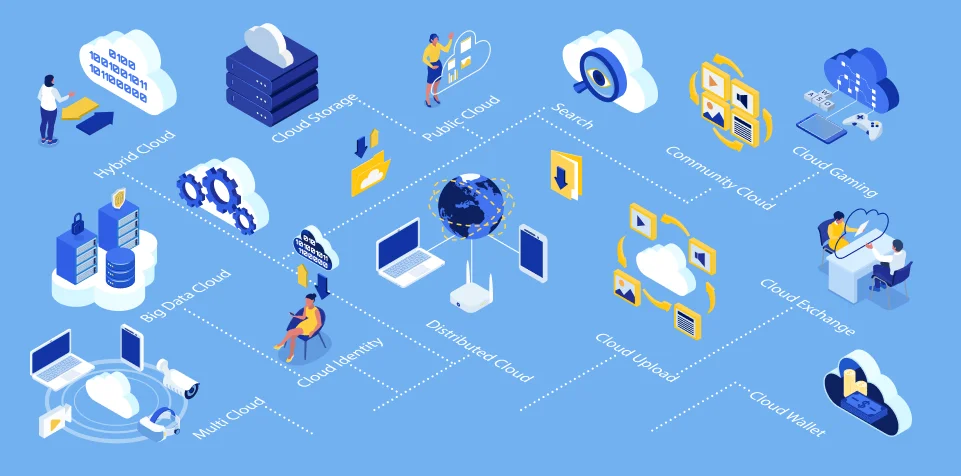9 Key Benefits of Cloud Migration You Need To Know
July 17, 2023

Over the past ten years, cloud computing has gained popularity and changed the way businesses operate. For enterprises of all sizes, it provides a wealth of benefits. A number of advantages come with moving to the cloud, including the capacity to effectively grow your operations, reduce expenses, and improve security. This post will go into more depth about these benefits and provide instances of actual businesses that have successfully made the switch to the cloud. Let’s first address typical worries regarding cloud migration, such as cost, security, and stability. You’ll know exactly what cloud migration requires, how difficult it might be, and—most importantly—what amazing advantages it offers by the time you’re done.
What is Cloud Migration?
Your data, apps, and IT resources must be moved to a cloud-based computing environment as part of cloud migration. This change has astounding benefits for companies of all sizes, including improved data security, increased agility, cost effectiveness, and more.
The cloud offers significant opportunities for small enterprises to quickly expand operations or escape the hassle of overseeing an own IT team. Larger businesses, on the other hand, may use the cloud to reduce expenses while maintaining unbroken service availability.
Is Cloud Migration Difficult and Challenging?

Nowadays, a lot of organizations choose to move their data, apps, and information from their own servers or nearby data centers to the public cloud. This action is designed to fulfill the particular requirements of each organization and has several advantages. Depending on how many resources are employed in the project, the difficulty of this migration procedure varies. Business services, online and mobile apps, IoT devices, edge servers, CRM systems, productivity software, enterprise databases, remote desktops, SD-WAN, network administration tools, and more platforms may all be transferred to the cloud.
Public cloud service providers with a solid reputations like AWS, Microsoft, IBM, Google, and Oracle give companies access to a strong and outstanding infrastructure. These service providers enable companies to function at a pace and scale that is unheard of thanks to high-speed fiber-optic connections that span several data centers across the world. Additionally, they provide a wide range of programming, web development, and support tools for mobile applications. For organizations that decide to host their operations in the cloud, this translates to improved support, quicker performance, and increased dependability.
Benefits of Cloud Migration

High Security
Security is a top worry for businesses, and cloud computing is a potent tool for addressing these worries head-on. Cloud service companies take enormous precautions to safeguard their systems, making it very difficult for hackers to get past their protections. They use strict security procedures and continuously monitor their systems, often round-the-clock, to quickly spot any shady activity.
Additionally, cloud service providers are aware of how crucial data preservation is. They often generate backups, ensuring that organizations can quickly restore their data in the case of data loss brought on by unforeseeable catastrophes like floods or fires. Furthermore, some service providers give extra services that are especially made to help organizations resume operations as soon as possible in the event of an interruption.
Scalability
Scalability is a significant benefit of cloud computing. This implies that organizations may easily alter their computer resources to meet their needs. This functionality is very useful for businesses that face fluctuating demand or unexpected spikes in website traffic.
Simply said, cloud computing enables firms to rapidly extend or contract their resources as needed. Assume a corporation need additional processing power during peak periods, such as Christmas sales. They can easily scale up their resources with cloud computing. During slower periods, on the other hand, they may easily cut back on resources to save money.
Cost Saving
For enterprises, cloud computing provides huge cost reductions. In the past, businesses had to spend a lot of money on purchasing physical infrastructure and pricey software applications to support their operations. Microsoft Office 365 survey reveals that 82% of small and medium-sized businesses (SMBs) have experienced cost reductions after embracing cloud technology. In addition, 70% of these businesses are reinvesting the saved funds back into their own operations.
Businesses may, however, avoid these up-front fees by moving to the cloud and only paying for the services they really use. Additionally, cloud providers manage updates and maintenance, negating the requirement for enterprises to employ specialized in-house IT staff. In simpler terms, cloud computing lets businesses save a ton of money by not having to buy expensive equipment and software upfront. They only pay for what they use, like renting instead of buying.
Plus, the cloud provider takes care of all the technical stuff, so the company doesn’t need as many IT people. It’s like having a cost-effective and hassle-free IT solution at your fingertips. Deloitte reports that a significant portion (62%) of the IT budget allocated by business and professional service companies is devoted to internal maintenance. However, embracing cloud migration can bring substantial advantages to your business. One such benefit is the ability to leverage economies of scale offered by public cloud providers like AWS, Microsoft, IBM, Google, and Oracle.
High Integration
By utilizing cloud technology, your company may effortlessly combine various systems and improve the efficiency of its services. According to a Frevvo poll, 59% of small and medium-sized businesses (SMBs) reported greater productivity after implementing cloud solutions. Data centers, like any other equipment, can become burdened with increased workloads and decreased efficiency over time. However, when it comes time to replace hardware, organizations now have the option of migrating their apps to the cloud. This change has various advantages, including the cloud provider handling hardware and software upgrades, saving money and time, and guaranteeing that apps always function on the most recent infrastructure.
Cloud services and apps are constantly improved, updated, and expanded to meet the demands of businesses and customers. This adaptability enables your cloud environment to expand and adapt to match your changing business needs, allowing your team to do more than ever before. Moving to the cloud also allows your mission-critical apps to adapt to changes in user traffic in real-time. Furthermore, your cloud provider can manage the complexities of managing your infrastructure, allowing you to concentrate on what actually matters: your business. With the simplicity and convenience of cloud-based remote access, your staff can focus on working diligently and pushing your company’s development.
Accessibility
By keeping your data in the cloud, you ensure that it is accessible no matter what the status of your physical infrastructure is. Cloud migration has the benefit of allowing people of your organization to access critical data and business information from anywhere in the globe, on any device. This creates several options for your company to grow and expand while meeting operational needs. Furthermore, having backup and logging systems in place becomes critical, especially when recovering from an outage and determining the underlying cause of the problem. Backups allow you to quickly restore activities, while logs provide vital insight into the cause of the problem. Following a cloud migration, your team will be able to deploy, upgrade, and debug numerous computers without being restricted to a single location. This flexibility reduces the headaches typically associated with traditional on-premises setups. And the best part is, the cloud’s consistent provisioning and deployment processes foster collaboration, ensuring that your entire team is synchronized and working towards the same goals.
Improved Business Agility
This is the main reason for the evolution of modern global economy. With access to dynamic, on-demand IT resources, you can keep pace with competitors and with the changing scenarios. Cloud fulfills 99% of your needs and companies need not wait for months to get hardware components and do installations. Companies can rapidly enter the market by leveraging the valuable capabilities offered by cloud providers through leasing arrangements.
Data Center Consolidation
Companies now do not have to manage their own data center premises. IT executives can collaborate with third-party cloud providers and can reallocate resources to higher-value activities. Also, enterprises can integrate operations and provide access to cloud services as and when needed resulting to increased efficiency.
Enabling Digital Transformation
With the spurt in enterprises getting upgraded to cloud solutions and with the recent advances in cloud computing, leaders have increasingly digitized core functionality, including SAP, CRM, data analytics, and much more. Those who migrate from legal technologies see improved productivity in their workforces and tap the new opportunities of generating revenue.
Accelerates Growth
Organizations are growing rapidly by integrating new acquisitions into existing platforms in the cloud. This is helping to scale quickly according to the demand and can use autoscaling functionality with flexible data management services.
Cloud Migration with Softqube Technologies

Many businesses have already taken the wise decision to migrate their operations to the cloud, and they have enjoyed significant benefits as a consequence. Netflix is a perfect example, having successfully moved its whole infrastructure to the cloud in 2016. This strategic decision enabled Netflix to lower expenses while increasing scalability, allowing it to successfully handle its large user base. Softqube Technologies has played a critical role in supporting easy and successful migrations to Amazon Web Services (AWS) for several enterprises over the years.
Undoubtedly, cloud migrations may be difficult, necessitating the assistance of a dependable company to guide you through the entire procedure. Softqube Technologies takes pleasure in collaborating with your team at every stage of the migration process to ensure a smooth and efficient transition. Our objective is to cultivate long-term ties that go beyond particular projects, building collaborations that will persist for years. To acquire a free evaluation and price for your cloud migration, please contact us using the link given. Please do not hesitate to contact our cloud migration specialists immediately to explore how we can help you achieve your objectives.







